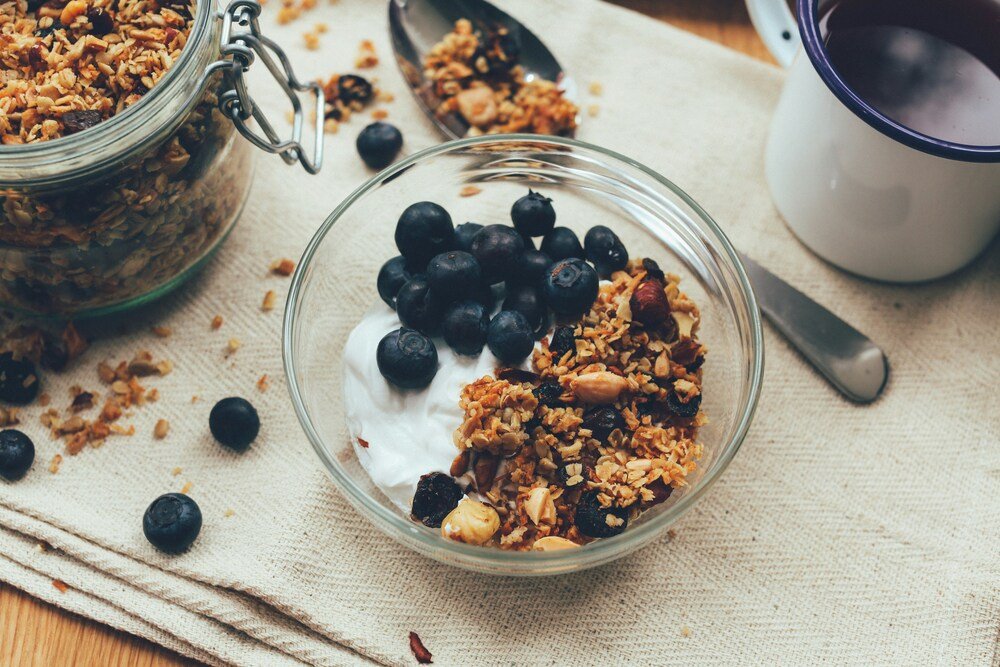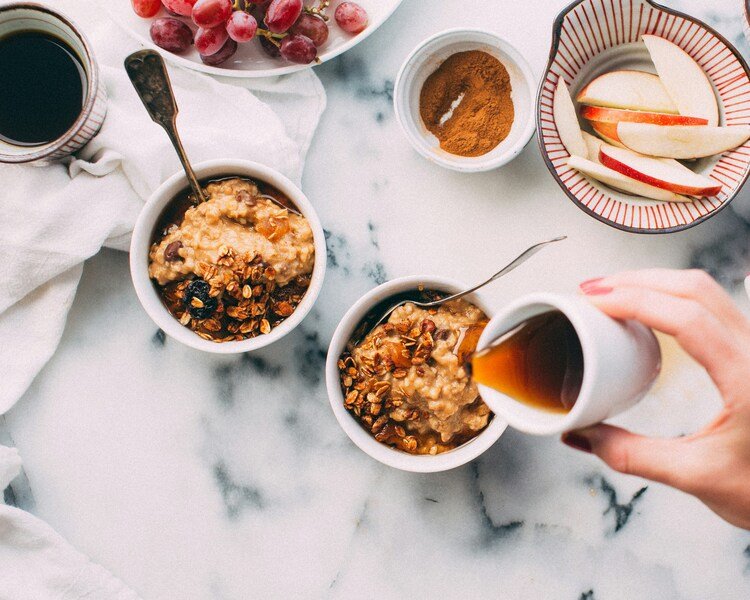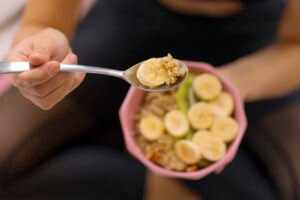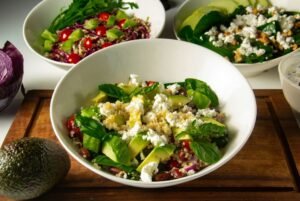Whether you’re new to running or an experienced runner trying to improve your daily routine, understanding what to eat before a morning run can have a big impact on your performance and the entire experience.
A good pre-run meal can give you the energy you need, keep you comfortable, and even help you recover faster. Let’s look at what you should eat before going for a morning run to get your day started right.
The Importance of Pre-Run Nutrition
Eating before a run provides many important purposes:
- Provides the necessary fuel for your body.
- Avoid the sensation of hunger
- Avoid dehydration
- Prevents gastrointestinal discomfort
- Improves stamina and endurance.
- Reduces the risk of feeling tired or hitting a “wall” during your run.
- Prevent the athlete from having an appetite while training.
- Helps in muscle repair and recovery post-run.
If you skip breakfast before running regularly, you risk losing performance benefits. Underfueling before running might result in inadequate calorie intake and a general drop in energy levels throughout the day. Chronic fatigue and decreased performance during training and races are also frequent.
Underfueling has long-term repercussions, including injury and RED-S (Relative energy deficiency in sports – a syndrome of poor health and declining athletic performance that happens when athletes do not get enough fuel through food to support the energy demands of their daily lives and training. RED-S can and does affect athletes of any gender and ability level).
Carbohydrates are the best fuel you can have
Carbohydrates are a macronutrient, composed of glucose molecules. Glucose is the simplest form of sugar. It acts as the body’s primary source of energy and the brain’s preferred source of energy.
Carbohydrates are typically classified as either simple or complex depending on their chemical structures.
Simple Carbohydrates
Simple carbohydrates, identified by their short chains of glucose molecules, can be broken down and absorbed by the body very quickly. Thus, simple carbohydrates provide our bodies with rapid bursts of energy shortly after ingestion. Although simple carbohydrates often get a bad reputation, they are ideal in situations that require immediate sources of energy likely if you are short on time.
Examples of simple carbohydrates are white bread, white rice, white pasta, rice cakes, honey, dried fruit, yogurt, milk, ripe bananas, ripe mangoes, jam, sports drinks, candy, crackers, energy gels, etc.
Complex Carbohydrates
Complex carbohydrates, characterized by their longer glucose molecule chains, take the body more time to break down. Because of this, complex carbohydrates do not spike our blood sugar as quickly as simple carbohydrates. They provide longer-lasting energy to our bodies, once absorbed.
In addition, complex carbs are more nutrition-dense than simple carbohydrates since they contain fiber, vitamins, and minerals. The body cannot digest fiber, a type of carbohydrate present in plant-based meals. Fiber is advised as part of a healthy diet because it has various benefits, including improving digestive health, regulating bowel motions, decreasing cholesterol, and controlling blood sugar levels. While there are numerous advantages to eating a fiber-rich diet, endurance runners are frequently advised to avoid eating fiber shortly before a run because it might induce gastrointestinal discomfort during exercise.
Examples of complex carbohydrates are whole-grain bread, brown rice, whole-grain pasta, whole grains (oats, quinoa, barley, etc.), beans, lentils, starchy vegetables (potatoes, sweet potatoes, squash, etc.), fiber-rich fruits (berries, apples, oranges, less ripe bananas, less ripe mangoes, etc.), fiber-rich vegetables (broccoli, leafy greens, carrots, etc.).
Timing Your Meal Before Run
Each person is different when it comes to eating a pre-run meal. Everyone tolerates certain foods and others they don’t, which leads to gastrointestinal discomfort.
The best way to find out which carbohydrates will be well-tolerated pre-race is to test and adapt your gut.
My tip when testing foods is to always start with small quantities. You don’t have to eat a bagel or a whole slice of bread with jam. It can be half a bagel/bread.
If a banana weighs you down, try eating half. Over time, you can try increasing the volume of food.
If you’ve never been a breakfast fan, the ideal is to give yourself more time to digest. In this case, you should wake up earlier than scheduled, maybe 2 hours earlier can be a good time to digest food.
Pre-Run Meal Ideas
I don’t know about you, but I’m one of those who love to sleep. That’s why my pre-race breakfast is never elaborate. Yours doesn’t have to be either! I’d rather spend more time sleeping than preparing my pre-race breakfast.
Another thing I don’t give up is my personal and cultural preferences when it comes to preparing my breakfast. This is another thing you should take into account in your pre-race preparation.
Here are some options (many of which I eat) for you to include as a pre-race snack:
Less than 60 minutes before the run
- Toast or Bagel with 100% fruit jam (my favorite)
- A large glass of fruit juice
- 1/2 white bread toast with jam + 1/2 banana (my favorite)
- Energy bar
- Toast with honey (my favorite)
- Low-fat crackers
- Fruit pouch (my favorite)
- Fruit smoothie
- Carbohydrate and nitrate supplement (easy and quick)

The options mentioned above are quick and easy to digest. Keep in mind that the longer the workout, the more carbohydrates you’ll require. In that scenario, you might want to plan properly and give yourself additional time to consider the options below.
2 hours or more before the run:
- Pre-made pancakes with fruit
- Greek yogurt with fruit and granola
- Bagel sandwich
- Baked Oatmeal
- Toast with jam and cream cheese

Remember that the actual portion size varies according to the athlete. The best way to find out the real portion size for you is to consult a sports dietitian. If you would like a personalized meal plan according to your routine and needs, contact me here.
Hydration: Don’t Forget the Fluids
Staying hydrated is just as important as what you eat. Start your morning with a glass of water (200ml) and continue to hydrate until you run. Ideally, you want to aim for ~450ml of fluids 1-2 hours before your run or training session. Avoid drinking a lot of water before running so you don’t feel like peeing in the middle of your run.
Opting for a sports drink and electrolyte-rich fluids at your breakfast before running can help you fulfill your fluid, carbohydrate, and electrolyte goals.
To Wrap up
Finding the right pre-run meal can make a world of difference in your running performance and overall enjoyment. Whether you’re a beginner or a regular runner, prioritize balanced meals that provide the energy and nutrients your body needs. Remember to stay hydrated, and listen to your body.
If you’re having trouble putting together your pre-run meal my 30-Day Meal Plan could be perfect for you. Within this complete and healthy meal plan for runners, you’ll find various pre-race options that will serve as fuel and help you improve your performance. Click here for more information. If you have any questions, please, contact me at: contact@anapaulaalonso.com.
Wishing you all fueled runnings!








